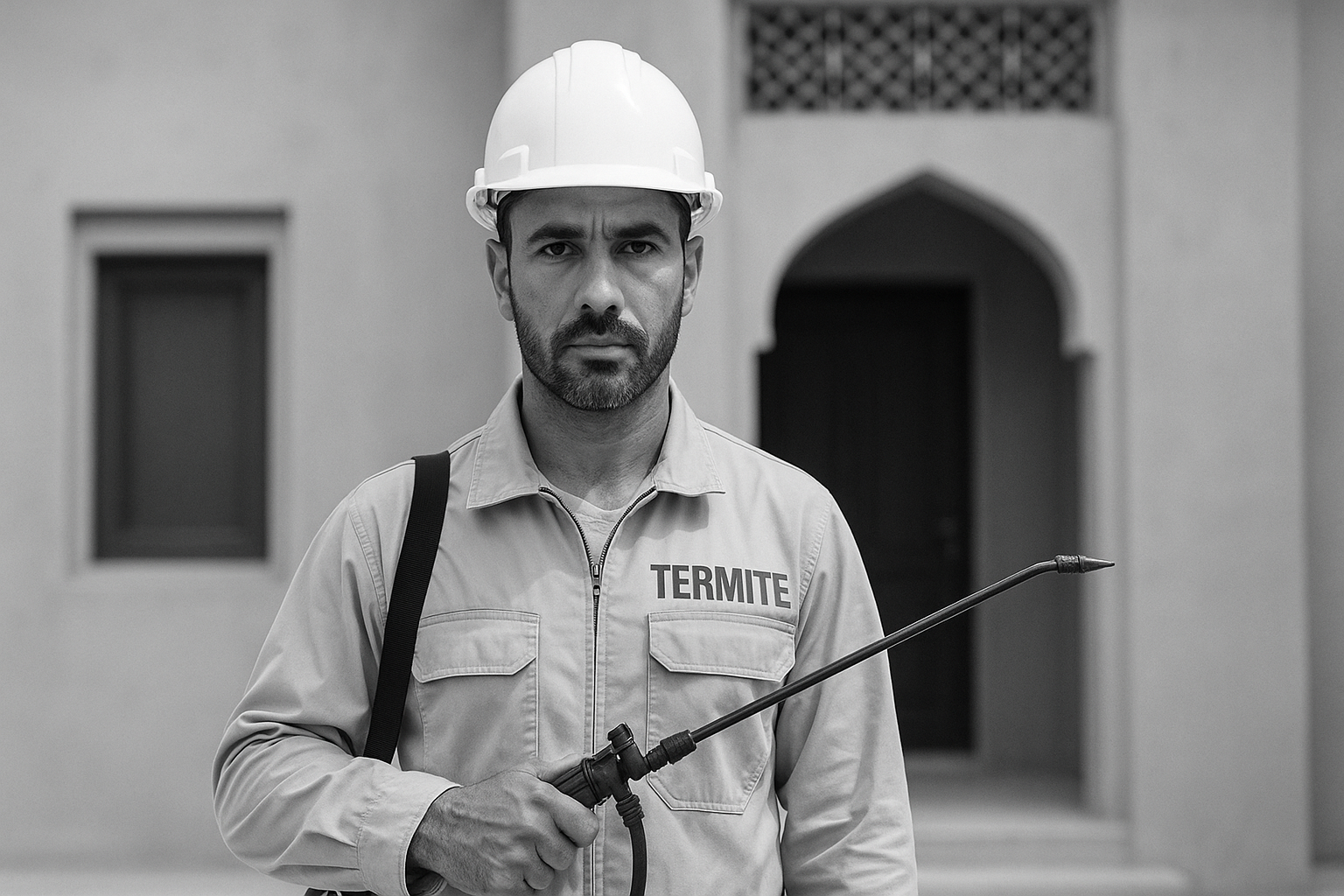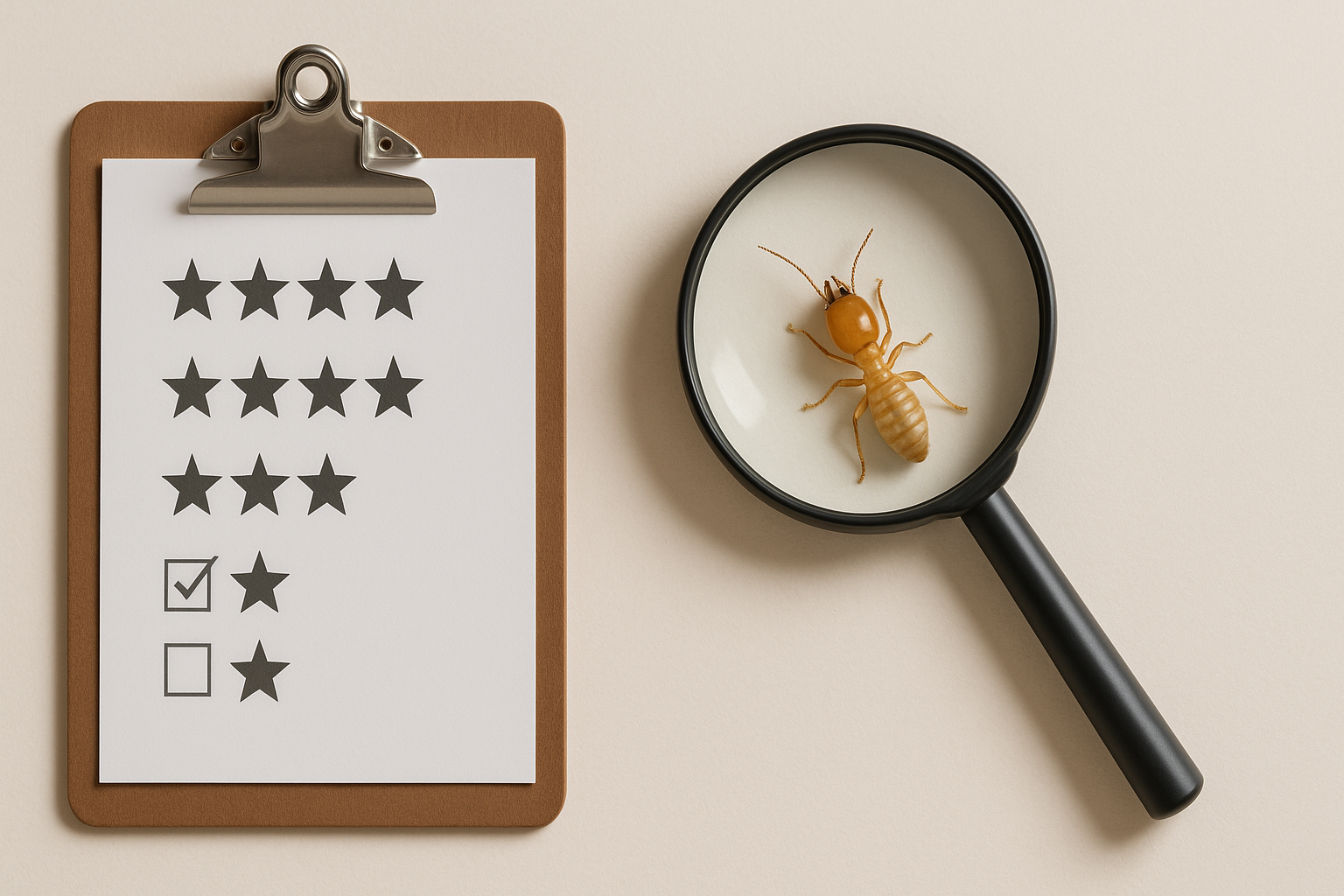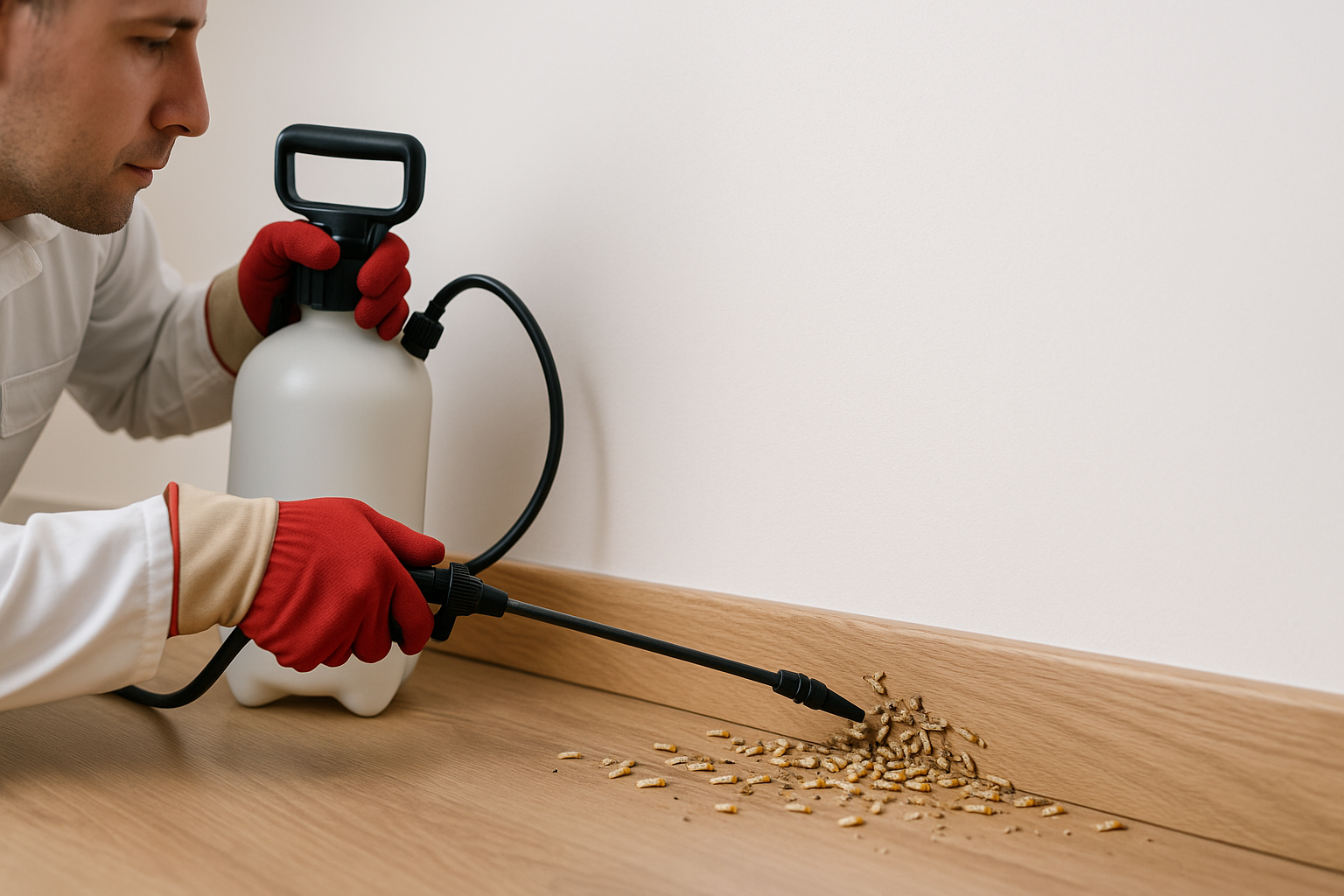Table of Contents
Understanding the Process and Importance of Termite Inspections in Dubai
For property owners and real estate developers in Dubai, termite infestations present a serious threat to the structural integrity and value of buildings. Given the region’s hot climate and the use of diverse construction materials, termite activity can often go unnoticed until substantial damage has been done. That is why Dubai Municipality Termite Inspection has become a crucial preventive measure mandated by municipal guidelines to safeguard residential, commercial, and public properties across the city.
Dubai Municipality has developed a structured Dubai Municipality Termite Inspection protocol aligned with local environmental conditions and building practices, making it one of the most comprehensive frameworks in the Gulf Cooperation Council (GCC) region for termite management. Understanding this inspection process, its scope, and the regulatory context helps stakeholders meet compliance requirements while protecting their investments.
Dubai Municipality Termite Inspection is a crucial process for property owners and businesses to safeguard their investments from termite damage. This inspection not only helps identify existing infestations but also ensures compliance with local regulations and health standards. Understanding the framework around these inspections offers both property managers and homeowners peace of mind and protection against costly repairs.
Termites, although often hidden from view, pose a serious threat to the structural integrity of buildings in Dubai. Given the city’s climate and rapid urban development—especially in areas like Business Bay, Dubai Marina, and Arabian Ranches—the risk of termite problems is significant enough to warrant professional inspections under the supervision of Dubai Municipality Termite Inspection guidelines.
This article will demystify the licensing requirements related to Dubai Municipality Termite Inspection, clarify what typical inspection reports must contain, and answer frequently asked questions, all within the context of Dubai Municipality’s regulations. Plus, we’ll highlight how trusted providers like Saniex, offering effective Dubai Municipality Termite Inspection services compliant with Dubai Municipality standards, specifically for Dubai properties.
Scope of Termite Inspections in Dubai
The core purpose of a Dubai Municipality Termite Inspection, as mandated by the Municipality, is to identify the presence of termite colonies, assess the extent of any existing infestation, and evaluate the risk potential based on property conditions and surroundings. The inspection covers both visible and hidden areas including structural supports, woodwork, insulation, flooring, and foundational elements that are prone to termite damage.
Key aspects included in the inspection are:
- Visual Examination: Inspectors conduct thorough surveys of accessible structural components, focusing on common termite pathways such as wooden beams, wall cavities, and moisture-prone areas.
- Moisture Assessment: Since termites thrive in moist environments, measuring humidity and detecting leaks or water damage is critical during the inspection.
- Use of Detection Tools: In addition to manual checks, modern tools like moisture meters, termite detectors, and borescopes may be used to uncover hidden infestations without invasive damage.
- Surrounding Environment Analysis: The exterior surroundings such as garden beds, mulch, or wooden fencing near the property are examined to evaluate external threats.
Each of these steps forms an integral part of the Dubai Municipality Termite Inspection process and enables a detailed report that informs whether termite treatment or preventive measures are needed.
Importance of Regular Termite Inspections in Dubai’s Context
Dubai’s unique climate confers particular challenges for termite management. The warm weather paired with the increasing greenery in urban developments creates an ideal environment for subterranean termites to thrive. Moreover, Dubai’s rapid property development and influx of older buildings in areas like Business Bay, Arabian Ranches, and Dubai Marina necessitate constant vigilance.
Regularly scheduled Dubai Municipality Termite Inspections serve several vital purposes:
- Preservation of Structural Integrity: Untreated termite damage weakens wooden and structural components, potentially leading to costly repairs or safety hazards.
- Compliance with Dubai Municipality Regulations: Properties, especially commercial and government-owned ones, must comply with pest management guidelines issued by Dubai Municipality for licensing and occupancy permits.
- Protection of Property Value: Terms such as “termite damage-free” significantly enhance property resale and leasing attractiveness in competitive neighborhoods like Downtown Dubai or Nad Al Sheba.
- Early Detection and Cost Control: Detection at an early infestation stage prevents widespread damage, thereby reducing the need for extensive treatments or structural repairs.
The inspection not only provides property owners with peace of mind but also supports Dubai’s broader public health and safety objectives.
Licensing Requirements for Termite Inspection in Dubai
In Dubai, all termite inspection services must be performed under a valid license issued by the Dubai Municipality’s Public Health Pest Control Section. This regulatory body ensures service providers meet stringent health and safety standards to protect residents and businesses.
The licensing process requires pest control companies to demonstrate specialized expertise in termite detection and treatment methods. The professionals conducting Dubai Municipality Termite Inspection must be trained and certified according to Dubai Municipality’s standards. This helps ensure that inspections are thorough, accurate, and compliant with local regulations, including environmental safety protocols.
Failing to use licensed inspectors can lead to invalid Dubai Municipality Termite Inspection reports, which may not satisfy regulatory or insurance requirements. Furthermore, unlicensed operations risk fines or penalties from Dubai authorities.
For detailed guidance on licensing and regulation of pest control services in Dubai, including termite inspections, refer to the Dubai Municipality’s official public health section.
Regulatory Framework and Compliance Guidelines
Dubai Municipality Termite Inspection operates within the framework of local regulations enforced by Dubai Municipality’s Pest Control Department. These regulations are harmonized with national best practices and address specific concerns related to pest control in residential, commercial, and mixed-use developments. For more detailed insights into compliance, property owners can review official Dubai Municipality Termite Inspection guidelines.
Some key points of the regulatory framework include:
- Mandatory Inspections: Properties undergoing major renovation, change of ownership, or conversion of commercial spaces are often required to submit termite inspection certificates as part of their permit applications to Dubai Municipality.
- Certified Pest Control Agents: Only licensed and certified termite inspection professionals registered with Dubai Municipality are authorized to conduct official inspections and issue reports accepted by government authorities.
- Reporting and Documentation: Detailed inspection reports specifying findings, infestation levels, and recommended treatment plans must be submitted electronically through the Dubai Municipality portals to ensure transparency and traceability.
- Adherence to UAE Environmental and Safety Standards: Treatments suggested as a follow-up to inspections are regulated for environmental safety under Dubai Municipality and MOCCAE (Ministry of Climate Change and Environment) guidelines, ensuring safe use of termiticides in accordance with the UAE’s environmental protection policies.
By adhering strictly to these regulations, property owners and managers not only comply with legal requirements but also maintain Dubai’s reputation as a safe, modern, and sustainable city.
What a Typical Termite Inspection Report Includes
After a Dubai Municipality Termite Inspection is conducted, clients receive a detailed report outlining the findings. This report is a critical document for property owners, buyers, or regulatory bodies requiring verification of pest status.
A standard Dubai Municipality Termite Inspection report typically contains the following elements:
- Property Details: Exact location (neighbourhood or community such as Nad Al Sheba or Medos), size, and description of the building.
- Inspection Date and Inspector Details: Name and credentials of the certified professional who performed the inspection along with the date of inspection.
- Inspection Methodology: Description of tools and procedures used, which may include visual examination, moisture meters, or specialized termite detection technologies.
- Findings: Presence or absence of termite activity, visible damages or risk areas such as wooden beams, flooring, and foundations.
- Recommendations: Suggested immediate or preventive treatments, monitoring plans, or follow-up inspections.
- Compliance Statement: Confirmation that the inspection adheres to Dubai Municipality’s pest control regulations and health standards.
This report serves multiple purposes, including supporting property transactions, insurance claims, or fulfilling periodic maintenance requirements.
Importance of Using Authorized Service Providers
Choosing an authorized provider for Dubai Municipality Termite Inspection is essential to ensure confidence in the results and adherence to regulatory standards. Authorized providers employ trained technicians who understand the nuances of termites in Dubai’s climate and the expectations set by the Municipality.
One key advantage is that authorized companies are updated with the latest detection techniques and environmentally friendly treatment methods. For example, Saniex offers Dubai Municipality Termite Inspection services that integrate deep knowledge of local pest pressures and regulatory compliance.
Moreover, authorized inspectors provide official Dubai Municipality Termite Inspection documentation recognized by government entities, regulators, and insurance companies. This paperwork is often indispensable when buying or selling property or fulfilling compliance deadlines.
Common Questions and Answers About Termite Inspection
How often should termite inspections be conducted in Dubai?
Regular inspections are recommended, especially for older buildings or those in high-risk areas like Dubai Marina or Business Bay. Typically, an annual inspection is advised, but specific recommendations depend on the property’s history and exposure to pest risks.
Does Dubai Municipality mandate termite inspections for all properties?
While not mandatory for every residential property, termite inspections become compulsory in several situations such as property sale, lease agreements, or commercial licensing. They form part of Dubai Municipality’s effort to maintain public health and structural safety.
What happens if termites are detected?
If termites are found, the inspection report will include remedial action recommendations. Licensed pest control companies then apply approved treatment methods. Ongoing monitoring is usually required to prevent recurrence.
Are termite inspection reports accepted by Dubai’s regulatory authorities?
Yes, reports issued by licensed providers in compliance with Dubai Municipality’s criteria are accepted as official documents for regulatory and legal processes.
Can I perform a termite inspection myself?
Due to the technical nature and regulatory demands, self-inspection is not advised or accepted officially. Only licensed professionals are authorized to perform valid inspections and produce recognized reports.
Integrated Pest Management Post-Inspection Recommendations
Beyond identifying current termite issues, a comprehensive inspection endorsed by Dubai Municipality often serves as the basis for establishing an Integrated Pest Management (IPM) plan tailored to each property’s unique circumstances. IPM strategies recommended after inspection usually include:
- Physical Barriers: Installation of termite shields or sand barriers during construction phases in new developments within locales such as Dubai Marina or Jumeirah ensures termites cannot access the building structure.
- Chemical Treatments: Use of approved termiticides around foundations and vulnerable areas following Dubai Municipality permits to eradicate or prevent infestations safely.
- Environmental Controls: Modifying landscaping practices to reduce moisture accumulation near foundations, such as proper irrigation techniques and removal of mulch or wooden debris that harbor termites.
- Routine Monitoring: Periodic follow-ups and re-inspections to detect any resurgence early, especially important for buildings in older communities like Al Wasl or areas under redevelopment.
These integrated control measures align with Dubai Municipality’s vision to minimize pesticide use where possible and promote sustainable, long-term termite management solutions.
The Role of Technology and Innovation in Termite Inspection
Dubai’s position as a technology-driven city extends even to pest control services. Advanced tools and innovations increasingly play a role in enhancing the accuracy and efficiency of termite inspections in Dubai, aligning with Dubai Municipality standards:
- Thermal Imaging: Infrared cameras detect heat signatures emitted by termite colonies hidden behind walls or beneath flooring.
- Acoustic Emission Devices: Specialized sensors pick up the faint sounds of termite activity, improving early detection in walls or wooden structures.
- Mobile Reporting Apps: Certified inspectors in Dubai use apps connected to Dubai Municipality systems to submit instant inspection results, enabling real-time processing and faster regulatory workflows.
These advances contribute not only to more thorough inspections but also improve compliance with Dubai Municipality reporting requirements and enhance the overall pest management ecosystem in Dubai.
Choosing the Right Inspection Provider in Dubai
Engaging a certified Dubai Municipality inspection professional is crucial for accurate diagnosis and regulatory acceptance. When selecting an inspection service in Dubai, consider these factors:
- Licensing and Accreditation: Ensure the company and technicians hold up-to-date licensing from Dubai Municipality’s Pest Control Department.
- Experience in Local Environments: Providers familiar with the distinct climatic and architectural conditions of Dubai’s neighborhoods such as Business Bay, Dubai Silicon Oasis, or the Palm Jumeirah offer more tailored assessments.
- Comprehensive Reporting: Reliable services provide detailed reports that comply with Dubai Municipality’s format and data requirements for documentation and follow-ups.
- Post-Inspection Support: Consider companies that offer or coordinate treatment and prevention options following inspection findings to provide a seamless pest management experience.
With these considerations, property owners can confidently manage compliance risks and protect their assets against termites effectively.
Conclusion and Call to Action
A Dubai Municipality Termite Inspection is not just a legal formality but a vital step in protecting property investments in Dubai. Licensed inspections guarantee compliance with local laws, preserve structural integrity, and reduce long-term repair costs. By working with certified providers like Saniex, property owners gain the assurance that every Dubai Municipality Termite Inspection is accurate, recognized, and effective.
Booking a Dubai Municipality Termite Inspection today ensures peace of mind, protects against hidden infestations, and supports Dubai’s vision for safe, sustainable urban living. By making termite inspections a regular practice, property owners contribute to the city’s reputation for modernity, safety, and strong property standards.





